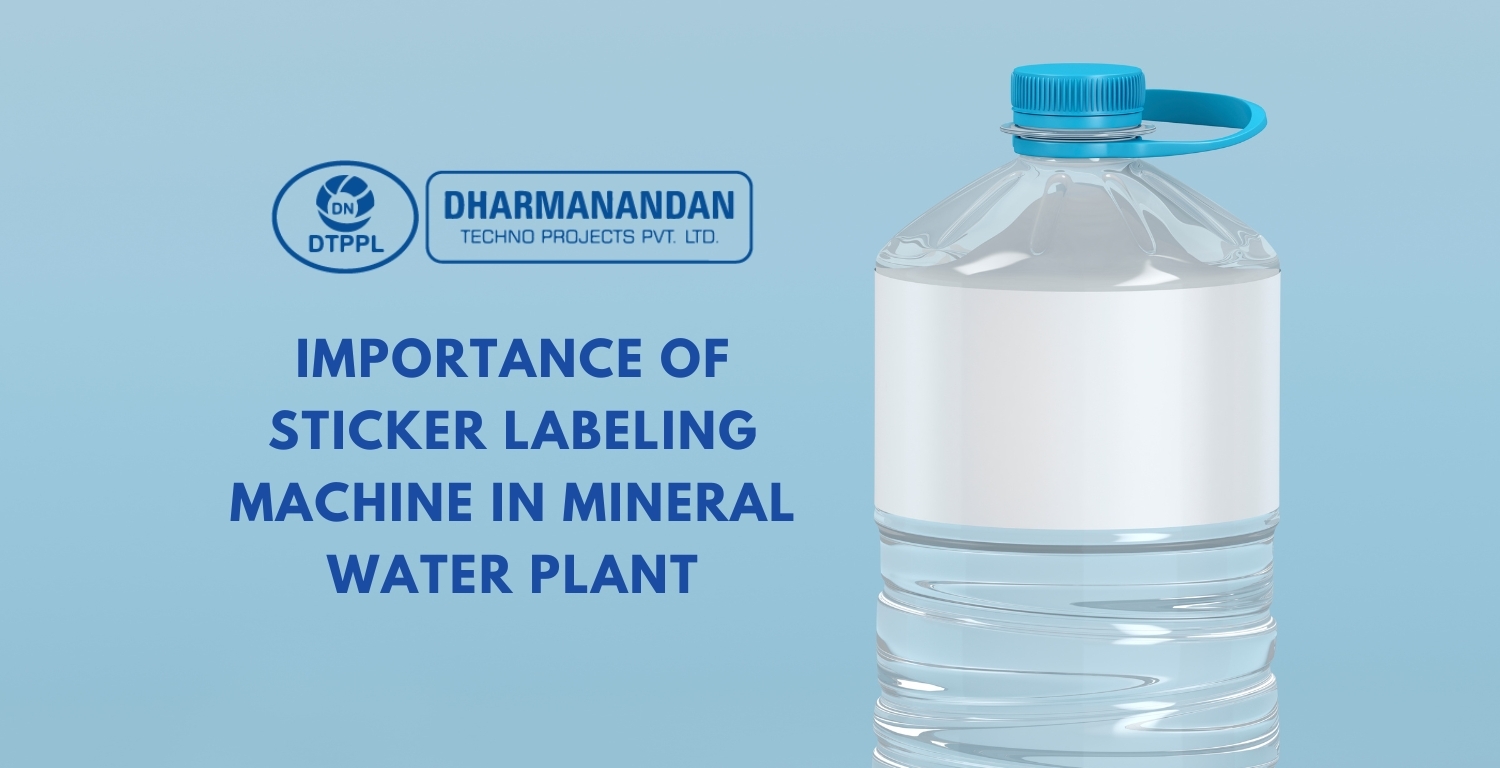
Table of Contents
Importance of Sticker Labeling Machine in Mineral Water Plant
September 15, 2024
Mineral water plants play a vital role in providing safe and clean drinking water to consumers, which has led to a surge in demand for these facilities. Proper packaging is a key factor in ensuring that the product is delivered to the market in a safe and appealing manner. Among the various elements of packaging, labelling is crucial for both compliance and branding.
Sticker labelling machines have revolutionised the packaging process in mineral water plants by automating label application with precision. They help ensure that each bottle carries the right information and branding elements, making the product market-ready.
A sticker labelling machine is an essential tool for mineral water plants, ensuring not only regulatory compliance but also brand visibility. In today’s competitive market, a bottle’s label can make or break its appeal to consumers.
By utilising a sticker labelling machine, companies can guarantee that their bottles are consistently labelled to meet industry standards while also showcasing their unique brand. This article delves into the importance of sticker labelling machines and how they impact the overall efficiency of a mineral water plant.
What is a Sticker Labeling Machine?
A sticker labelling machine is a highly specialised piece of equipment used to apply labels accurately and efficiently to bottles, containers, or other products. In mineral water plants, these machines are designed to handle high volumes, ensuring that each bottle is labelled with precision and speed.
There are various types of sticker labelling machines available, including automatic, semi-automatic, and manual versions, depending on the production scale. These machines help mineral water plants streamline the packaging process, eliminating human error and maintaining consistency across batches.
Sticker labelling machines are crucial because they handle large quantities of bottles with minimal supervision, allowing the plant to operate efficiently. They also enable customisation of label designs, making it easy to switch between different branding or compliance requirements.
Furthermore, the use of these machines reduces manual labour, resulting in cost savings for the plant. As automation becomes more prevalent in the bottling industry, sticker labelling machines are proving indispensable for achieving both productivity and compliance.
How Sticker Labeling Machines Work
Sticker labelling machines operate through a series of automated processes that ensure precise application of labels on each bottle. The process begins with the bottle being transported via a conveyor belt to the labelling station, where sensors detect the exact position of the bottle.
Once the bottle is in place, the label is dispensed from a roll and applied with adhesive, ensuring it sticks smoothly. The machine’s sensors then verify that the label has been applied correctly, ensuring accuracy in every batch.
This automated process is vital in a mineral water plant, where thousands of bottles need to be labelled every day. The machine ensures speed without compromising on accuracy, preventing issues like misalignment or air bubbles under the label.
With advanced technologies such as touchscreens and programmable settings, operators can easily control and adjust the machine for different bottle sizes and label designs. This efficiency reduces the need for manual intervention, allowing the production line to run smoothly and continuously.
Key Components of a Sticker Labeling Machine
Sticker labelling machines are composed of several key components that work together to ensure smooth operation. One of the most important parts is the label dispenser, which feeds labels from a roll and applies them to the bottles with precision. Another essential component is the conveyor belt, which transports the bottles to the labelling station.
Sensors and control panels help regulate the speed and timing of the machine, ensuring that labels are applied accurately. Additional components include rotating platforms and guide rails that help position bottles correctly before labelling.
Maintaining these components is crucial for the long-term efficiency of the machine. Regular cleaning and calibration of sensors and control panels ensure the machine operates without interruptions. Proper care of the label dispenser and conveyor belt also prevents issues like misalignment or jamming.
By ensuring all parts are functioning well, mineral water plants can keep their production lines running smoothly and avoid costly downtime caused by mechanical failures.
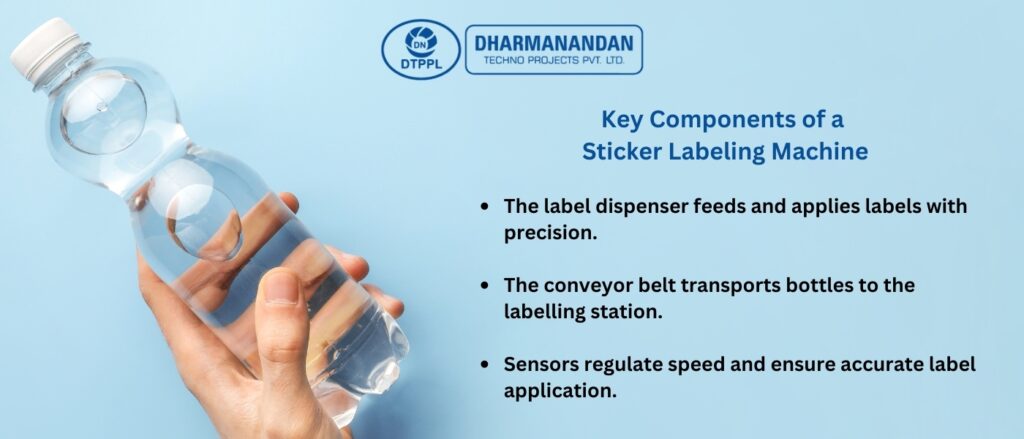
Enhancing Branding and Product Identity with Sticker Labeling
In the competitive bottled water industry, effective branding is key to standing out from the competition. Sticker labelling machines allow companies to apply high-quality, custom-designed labels to their bottles, enhancing their brand’s identity.
These labels can include unique designs, colours, logos, and product information, all of which contribute to a strong brand presence on store shelves. With the help of sticker labelling machines, mineral water plants can ensure that their products are consistently labelled in a way that reinforces brand recognition.
A well-designed label not only attracts consumers but also helps build trust by providing important information such as the source of the water and its purity level. Sticker labelling machines make it easy to apply these detailed labels with precision, ensuring that every bottle leaves the plant with a professional finish.
This consistency is crucial for maintaining a strong brand image and building customer loyalty, as consumers are more likely to trust a product that is well-packaged and clearly labelled.
Compliance with Regulatory Standards
Sticker labelling machines play a critical role in ensuring that mineral water plants comply with regulatory labelling standards. In many countries, including India, the USA, and the UK, bottled water must meet specific guidelines regarding the information that appears on the label.
This can include details such as the water source, nutritional information, and expiry dates. Sticker labelling machines ensure that this information is applied accurately and consistently, helping companies avoid fines or legal issues associated with mislabelling.
Furthermore, these machines are often equipped with advanced technologies that can track and verify each label’s accuracy. This is particularly important when it comes to meeting the strict guidelines set by agencies such as the Food Safety and Standards Authority of India (FSSAI) or the US Food and Drug Administration (FDA).
By ensuring that every bottle is labelled in compliance with local and international regulations, sticker labelling machines help companies protect their reputation and remain competitive in the market.
The Role of Sticker Labelling in Quality Control
Sticker labelling machines contribute significantly to the quality control process in mineral water plants. One of their primary functions is to ensure that labels are applied accurately, without wrinkles, misalignment, or gaps.
Proper label application is essential not only for aesthetic reasons but also for regulatory compliance. By automating the labelling process, these machines minimise human error, ensuring that every bottle meets the plant’s quality standards.
Additionally, sticker labelling machines can be integrated with other quality control systems to track and trace batches, ensuring full traceability. This is particularly important in the event of a recall or a quality issue.
By having each bottle correctly labelled and recorded, companies can quickly identify and isolate problematic batches. This level of quality control is critical in the highly regulated bottled water industry, where consumer safety is paramount.
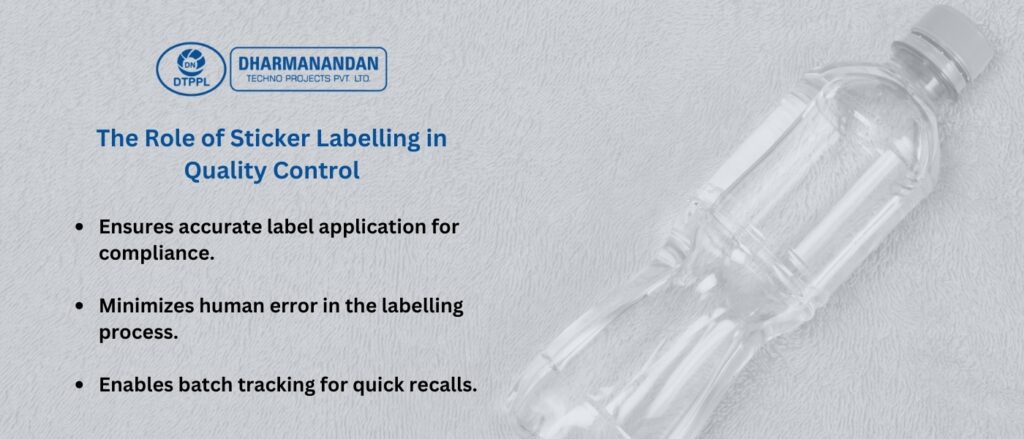
Increasing Production Efficiency with Sticker Labeling Machines
Sticker labelling machines significantly increase production efficiency in mineral water plants by automating the entire labelling process. Traditionally, labelling was done manually, which was not only time-consuming but also prone to errors.
By automating the process, sticker labelling machines allow the plant to label thousands of bottles per hour, ensuring a faster production line and reducing the need for manual labour. This increased speed directly translates to higher output, allowing companies to meet growing consumer demand.
Moreover, the precision of sticker labelling machines reduces the risk of product recalls due to mislabelled bottles, which can be costly both in terms of finances and brand reputation. Automation also allows for greater flexibility in production, as these machines can easily switch between different label designs or bottle sizes. This adaptability helps mineral water plants remain competitive by offering a diverse range of products without compromising on efficiency.
Reducing Waste and Minimising Costs
Sticker labelling machines contribute to cost-saving efforts in mineral water plants by reducing waste in the labelling process. Manual labelling often leads to errors, such as incorrect label placement or label wastage due to mishandling.
With a sticker labelling machine, labels are applied precisely and consistently, minimising the amount of waste generated. This helps reduce material costs, which can add up significantly when dealing with large-scale production.
In addition to reducing label waste, sticker labelling machines also cut down on labour costs. By automating the process, companies can operate with fewer workers dedicated to labelling, allowing them to allocate human resources to other critical areas.
This combination of reduced waste and lower labour costs makes sticker labelling machines an essential investment for any mineral water plant looking to optimise its production process and improve its bottom line.
Adaptability and Flexibility in Labelling Various Bottle Sizes
Sticker labelling machines are designed to offer flexibility, which is crucial for mineral water plants that produce bottles in various shapes and sizes. These machines can be easily adjusted to accommodate small, medium, or large bottles without the need for significant modifications.
This adaptability allows mineral water plants to efficiently manage different product lines, ensuring that each bottle is labelled accurately regardless of its dimensions. This feature is especially beneficial for companies that offer both single-serving bottles and larger family-sized containers.
Furthermore, the ease with which operators can switch between different bottle types ensures minimal downtime during production. As market demands shift, sticker labelling machines provide the flexibility to quickly introduce new bottle designs or label types without disrupting the production line.
This versatility helps mineral water plants stay competitive by meeting diverse consumer preferences while maintaining efficiency in their operations.
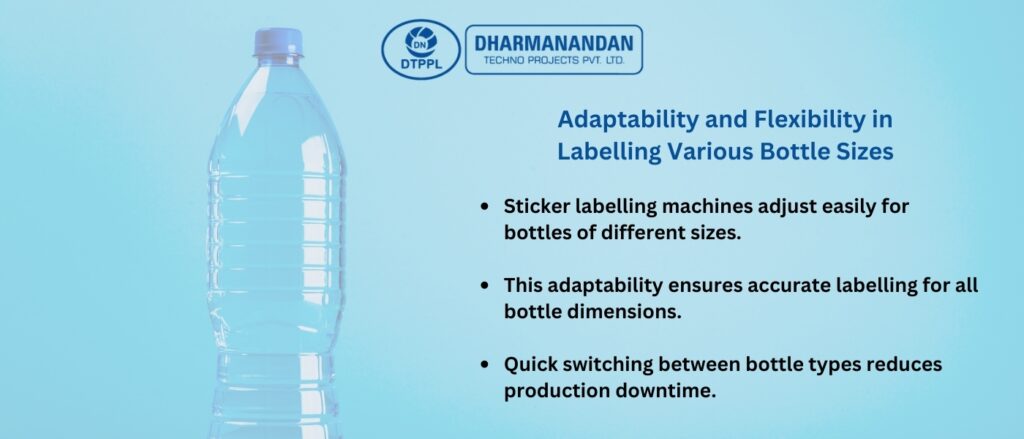
Challenges Faced by Mineral Water Plants in Labeling
Mineral water plants face several challenges when it comes to labelling, including the risk of misalignment, air bubbles, or incorrect label application. These issues can be time-consuming to correct and may result in wasted labels or production delays.
Sticker labelling machines, however, help to mitigate these challenges by automating the process and ensuring a consistent, high-quality application of labels. By reducing human error, these machines help maintain efficiency and prevent costly mistakes in the production line.
Additionally, another common challenge is the need to keep up with regulatory changes in labelling requirements. New guidelines regarding the information that must appear on labels can create complications for manual labelling processes.
Sticker labelling machines can be easily reprogrammed to apply updated labels, ensuring that the plant remains compliant with evolving industry standards. This adaptability helps prevent compliance-related issues and ensures smooth production operations.
Technological Advancements in Sticker Labelling Machines
Recent technological advancements have greatly enhanced the capabilities of sticker labelling machines, making them more efficient and user-friendly. Modern machines are equipped with touchscreens, programmable settings, and smart sensors that enable operators to easily control the labelling process.
These innovations allow for greater precision in label application, reducing the chance of errors such as misalignment or label overlap. In addition, some machines are now integrated with IoT technology, enabling remote monitoring and real-time diagnostics.
One of the most significant advancements is the integration of digital printing technology within sticker labelling machines. This allows mineral water plants to print and apply custom labels in a single step, reducing production time and costs.
The use of cutting-edge technology has transformed sticker labelling machines into intelligent, efficient systems that can easily adapt to the changing needs of the market. As technology continues to evolve, these machines will become even more valuable to the bottled water industry.
Maintenance and Troubleshooting of Sticker Labelling Machines
Proper maintenance of sticker labelling machines is crucial to ensuring their long-term performance and reliability. Regular cleaning of key components, such as the label dispenser and sensors, helps prevent the build-up of debris that could interfere with the machine’s accuracy.
Additionally, periodic calibration ensures that the machine continues to apply labels with precision, reducing the likelihood of misalignment or other errors. By scheduling routine maintenance checks, mineral water plants can avoid unexpected breakdowns and keep their production lines running smoothly.
When it comes to troubleshooting, many modern sticker labelling machines come equipped with diagnostic tools that help identify and resolve issues quickly. These tools allow operators to detect problems such as label jams or sensor malfunctions and address them before they cause significant downtime.
By promptly addressing any technical issues, mineral water plants can minimise production delays and maintain consistent output. Investing in proper maintenance and troubleshooting ensures the machine’s longevity and operational efficiency.
How to Choose the Right Sticker Labeling Machine for Your Mineral Water Plant
When selecting a sticker labeling machine for a mineral water plant, it’s essential to consider factors such as production capacity, bottle size, and labelling requirements. The machine should be able to handle the plant’s daily output, with the flexibility to accommodate changes in production volume if needed.
Additionally, the machine must be compatible with the various bottle shapes and sizes used by the plant, ensuring that labels are applied accurately across all product lines. Companies should also consider the ease of use and the level of automation they require, as this will impact both the machine’s efficiency and its integration into the existing production line.
Another crucial factor to consider is the machine’s compliance with regulatory standards. Sticker labelling machines should have the ability to apply labels that meet all necessary guidelines, including product information, expiration dates, and health certifications.
It’s also important to choose a machine from a reputable manufacturer that offers good after-sales support, including maintenance services and spare parts. By carefully evaluating these factors, mineral water plants can choose the right sticker labelling machine to meet their production and compliance needs effectively.
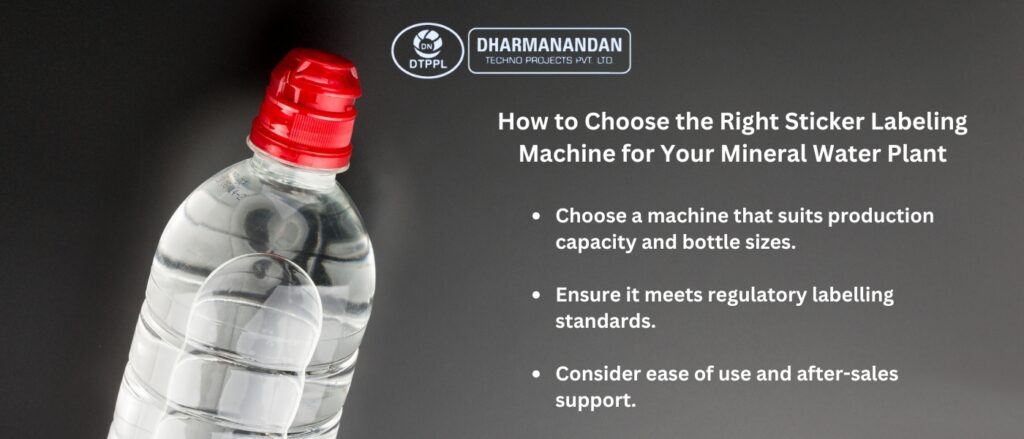
Cost-Benefit Analysis of Investing in a Sticker Labeling Machine
Investing in a sticker labelling machine can seem like a significant expense upfront, but the long-term cost benefits are undeniable. One of the most immediate advantages is the reduction in labour costs. By automating the labelling process, companies can reduce their reliance on manual labour, freeing up staff to focus on other important tasks.
Additionally, automated machines offer a higher level of precision, which reduces the risk of mislabelled bottles and the associated costs of reworking or discarding faulty products.
Over time, the increased production efficiency and reduced waste can lead to substantial savings for the mineral water plant. The machine’s ability to label bottles quickly and accurately translates into faster production times, allowing the plant to meet higher demand without the need for additional resources.
In this way, a sticker labelling machine pays for itself through improved productivity and reduced operational costs. With a well-chosen machine, the return on investment is both significant and sustainable.
Conclusion
Sticker labelling machines have become an indispensable asset in the mineral water industry, providing unparalleled efficiency, precision, and compliance. Their ability to streamline the labelling process not only ensures that bottles are accurately branded and meet regulatory requirements but also significantly enhances the production capacity of mineral water plants.
By automating a previously labour-intensive task, these machines help reduce costs, minimise human error, and maintain consistent quality across all products. Furthermore, the flexibility and adaptability of sticker labelling machines make them ideal for handling various bottle sizes and designs, allowing companies to keep pace with changing market demands.
As technology continues to evolve, these machines are becoming even more advanced, offering enhanced features that improve both productivity and sustainability. Investing in a high-quality sticker labelling machine is not just about meeting current production needs, but also about future-proofing the plant for long-term growth and success.
About Author

Director – Global Marketing and Sales
Mr. Bhavesh from Dharmanandan Techno Projects Pvt. Ltd. has played a pivotal role in elevating the DTPPL brand to the global stage, leveraging his exceptional expertise in marketing and communications. He is committed to helping clients achieve significant growth while strengthening their own brands. Dharmanandan Techno Projects Pvt. Ltd. is a leading manufacturer and supplier of water purification systems and turnkey solutions for mineral water plants. With years of experience in designing and delivering high-quality water treatment solutions, the company provides end-to-end services, including system design, installation, maintenance, and ongoing support. Specializing in scalable and customizable water plants, DTPPL has successfully served industries worldwide, ensuring clean and safe drinking water across diverse applications.




